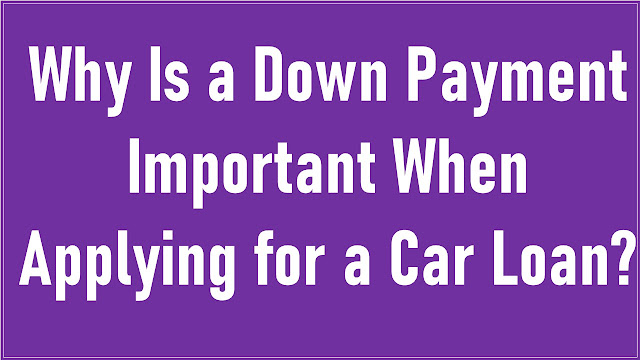
Introduction.
In this article, I’ll explore the crucial aspect of securing a down payment when applying for a car loan and shed light on why it holds such paramount importance in the world of automotive financing. A down payment, often underestimated, plays a pivotal role in the car loan application process. It’s the initial sum of money that prospective car buyers put down upfront before financing the remaining cost of their desired vehicle. This financial step may seem like a mere formality, but it carries substantial implications that extend beyond mere paperwork.
The importance of a down payment lies in its multi-faceted impact on the car-buying journey. Not only does it directly influence the loan amount you need, but it also affects interest rates, monthly payments, and even your chances of loan approval. Moreover, a substantial down payment signifies commitment and financial responsibility, making you a more attractive candidate for lenders. In the following sections, we will delve into these critical aspects and demonstrate why a down payment should be carefully considered when embarking on the path to automotive ownership.
- Financial Responsibility: Demonstrates ability to manage financial commitments.
- Reduced Loan Amount: Lowers the overall loan principal, reducing debt burden.
- Lower Interest Rates: Leads to better interest rates and loan terms.
- Equity and Asset Value: Builds ownership stake in the car.
- Lender Confidence: Shows commitment and creditworthiness to lenders.
- Monthly Payment Management: Affects manageable monthly payment amounts.
Financial Responsibility: Demonstrates ability to manage financial commitments.
Making a down payment on a car loan is a significant step that reflects your financial responsibility. It shows that you are capable of managing your financial commitments, and this is a positive signal to lenders. When you invest a portion of your own money into the purchase of a car, you’re essentially telling the lender that you are serious about the loan and willing to take on a share of the financial responsibility. This initial financial commitment can be seen as a reliable indicator of your creditworthiness and your ability to meet future obligations.
From a lender’s perspective, an applicant who is willing and able to make a down payment is less likely to default on the loan. This is because you have a personal stake in the car and are less likely to walk away from the financial commitment. As a result, lenders may be more inclined to offer you favorable terms, such as a lower interest rate, longer repayment period, or a higher loan amount, knowing that you have already displayed financial responsibility.
Furthermore, the act of making a down payment can also be a valuable exercise in financial planning. It forces you to assess your budget and allocate funds for a substantial purchase, demonstrating your ability to manage your finances effectively. This ability to budget and save for a down payment is not only beneficial for the car loan application but also for your overall financial well-being. In essence, a down payment serves as a tangible representation of your financial responsibility and stability, which can greatly impact the outcome of your car loan application.
Reduced Loan Amount: Lowers the overall loan principal, reducing debt burden.
One of the key benefits of making a down payment when applying for a car loan is that it reduces the overall loan amount you need to borrow. By committing your own money upfront, you’re essentially contributing to the cost of the car, which means you’ll need to finance a smaller portion of the purchase through the loan. This reduction in the loan amount has several significant advantages.
First, a smaller loan amount means a reduced debt burden. With less money to repay, you’ll have a more manageable financial obligation. This can lead to lower monthly payments, making it easier to fit the car loan into your budget without straining your finances.
Second, a reduced loan amount also lowers the overall interest costs associated with the loan. Interest is typically calculated as a percentage of the outstanding loan balance, so the less you need to borrow, the less interest you’ll pay over the life of the loan. This can result in substantial savings in the long run.
Additionally, a smaller loan amount can improve your chances of getting approved for the loan in the first place. Lenders are more likely to approve loans with lower principal amounts, as they pose less risk to the lender. If you have a strong credit profile and a down payment to reduce the loan size, you’re seen as a more attractive and less risky borrower.
Lower Interest Rates: Leads to better interest rates and loan terms.
A substantial down payment can significantly impact the interest rates and loan terms you are offered when applying for a car loan. Lenders use a variety of factors, including credit history and the loan-to-value ratio, to determine the interest rate for your loan. The loan-to-value ratio is the ratio of the loan amount to the car’s value, and a larger down payment results in a lower ratio. This lower ratio can lead to more favorable interest rates and loan terms.
When you make a substantial down payment, it indicates to the lender that you are invested in the purchase and have a lower risk of defaulting on the loan. This reduces the lender’s perceived risk, which, in turn, often leads to lower interest rates. A lower interest rate can save you a significant amount of money over the life of the loan, as you’ll pay less in interest with each monthly payment.
Moreover, better loan terms, such as a longer repayment period, can make your monthly payments more manageable. This can be particularly beneficial if you’re working within a tight budget and need to spread out your payments over a longer timeframe. Lower interest rates and favorable terms not only make the loan more affordable but also enhance your overall financial stability.
Financial Responsibility: Demonstrates ability to manage financial commitments.
Making a down payment on a car loan is a significant step that reflects your financial responsibility. It shows that you are capable of managing your financial commitments, and this is a positive signal to lenders. When you invest a portion of your own money into the purchase of a car, you’re essentially telling the lender that you are serious about the loan and willing to take on a share of the financial responsibility. This initial financial commitment can be seen as a reliable indicator of your creditworthiness and your ability to meet future obligations.
From a lender’s perspective, an applicant who is willing and able to make a down payment is less likely to default on the loan. This is because you have a personal stake in the car and are less likely to walk away from the financial commitment. As a result, lenders may be more inclined to offer you favorable terms, such as a lower interest rate, longer repayment period, or a higher loan amount, knowing that you have already displayed financial responsibility.
Furthermore, the act of making a down payment can also be a valuable exercise in financial planning. It forces you to assess your budget and allocate funds for a substantial purchase, demonstrating your ability to manage your finances effectively. This ability to budget and save for a down payment is not only beneficial for the car loan application but also for your overall financial well-being. In essence, a down payment serves as a tangible representation of your financial responsibility and stability, which can greatly impact the outcome of your car loan application.
Reduced Loan Amount: Lowers the overall loan principal, reducing debt burden.
One of the key benefits of making a down payment when applying for a car loan is that it reduces the overall loan amount you need to borrow. By committing your own money upfront, you’re essentially contributing to the cost of the car, which means you’ll need to finance a smaller portion of the purchase through the loan. This reduction in the loan amount has several significant advantages.
First, a smaller loan amount means a reduced debt burden. With less money to repay, you’ll have a more manageable financial obligation. This can lead to lower monthly payments, making it easier to fit the car loan into your budget without straining your finances.
Second, a reduced loan amount also lowers the overall interest costs associated with the loan. Interest is typically calculated as a percentage of the outstanding loan balance, so the less you need to borrow, the less interest you’ll pay over the life of the loan. This can result in substantial savings in the long run.
Additionally, a smaller loan amount can improve your chances of getting approved for the loan in the first place. Lenders are more likely to approve loans with lower principal amounts, as they pose less risk to the lender. If you have a strong credit profile and a down payment to reduce the loan size, you’re seen as a more attractive and less risky borrower.
Lower Interest Rates: Leads to better interest rates and loan terms.
A substantial down payment can significantly impact the interest rates and loan terms you are offered when applying for a car loan. Lenders use a variety of factors, including credit history and the loan-to-value ratio, to determine the interest rate for your loan. The loan-to-value ratio is the ratio of the loan amount to the car’s value, and a larger down payment results in a lower ratio. This lower ratio can lead to more favorable interest rates and loan terms.
When you make a substantial down payment, it indicates to the lender that you are invested in the purchase and have a lower risk of defaulting on the loan. This reduces the lender’s perceived risk, which, in turn, often leads to lower interest rates. A lower interest rate can save you a significant amount of money over the life of the loan, as you’ll pay less in interest with each monthly payment.
Moreover, better loan terms, such as a longer repayment period, can make your monthly payments more manageable. This can be particularly beneficial if you’re working within a tight budget and need to spread out your payments over a longer timeframe. Lower interest rates and favorable terms not only make the loan more affordable but also enhance your overall financial stability.
Conclusion.
I hope this discussion has shed light on the crucial role of a down payment when applying for a car loan. In conclusion, a down payment significantly benefits both the borrower and the lender. It demonstrates the borrower’s financial responsibility, commitment, and ability to manage their finances. This can lead to more favorable loan terms, including lower interest rates and shorter loan durations, ultimately saving the borrower money in the long run. Additionally, a substantial down payment reduces the risk for the lender, making it more likely for borrowers to secure approval, even if they have less than perfect credit.
A down payment is a powerful financial tool that empowers car buyers to make a more sound and affordable investment in their vehicle. It helps build equity from day one, lowers monthly payments, and instills discipline in managing finances. Therefore, it’s not just a requirement, but a strategic choice for those seeking a car loan, offering financial security and peace of mind for both the borrower and the lender.
